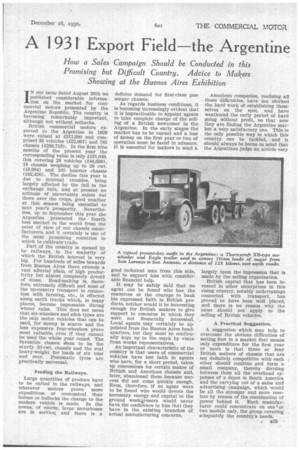A 1931 Export Field the Argentine
Page 91

If you've noticed an error in this article please click here to report it so we can fix it.
How a Sales Campaign Should be Conducted in this Promising but Difficult Country. Advice to Makers Showing at the Buenos Aires Exhibition
IN our issue dated August 26th we published considerable information on the market for commercial motors presented by the Argentine Republic. The country is becoming remarkably important, although not without setbacks.
British commercial motors exported to the Argentine in 1929 were valued at £311,380 and comprised 33 vehicles (£22,667) and 785 chassis (£288,713). In the first nine months of the present year the corresponding value is only 1131,049, this covering 28 vehicles (£44,639), 18 chassis weighing up to 28 cwt. (£3,984) and 195 heavier chassis (£82,426). The decline this year is due to internal troubles, being largely affected by the fall in the exchange rate, and at present an attitude of uncertainty exists Out there over the crops, good weather at this season being essential to next year's prosperity. Nevertheless, up to September this year the Argentine presented the fourth best market in the world from the point of view of our chassis manufacturers, and it certainly is one of the most promising countries in which to cultivate trade.
Part of the country is opened up by railways, in the majority of which the British interest is very big. For hundreds of miles inwards from Buenos Aires there extends a vast alluvial plain, of high productivity but almost completely devoid of stone. Road-making is, therefore, extremely difficult and most of the up-country transport in connection with farming, etc., is effected along earth tracks which, in many places, become impassable during winter rains. This does not mean that six-wheelers and sfich types are the only motor vehicles that can be used, for money is scarce and the less expensive four-wheelers prove most valuable, even if they cannot be used the whole year round. The favourite classes geem to be the sturdy 30-cwt. chassis and the real heavy-weight for loads of six tons and over. Pneumatic tyres are practically universal.
Feeding the Railways.
Large quantities of produce have to be carted to the railways, and wherever motors prove more expeditious or economical than horses or bullocks the change to the modern vehicle is made. In the towns, of course, large motorbuses are in service; and there is a definite demand for first-class passenger chassis.
As regards business conditions, it is becoming increasingly evident that it is impracticable to appoint agents to take complete charge of the selling of a British newcomer in the Argentine. In the early stages the market has to be nursed and a loss of money on the first year or two of operation must be faced in advance. It is essential for makers to send a
good technical man from this side, and to support him with considerable financial help.
It may be safely said that no agent can be found who has the resources or the courage to back his expressed faith in British products, neither would it be interesting enough for British makers to give support to concerns in which they were not financially interested. Local agents may certainly be appointed from the Buenos Aires headquarters, but they must be continually kept up to the mark by visits from works representatives.
An important characteristic of the country is that users of commercial vehicles have lost faith in agents who have, for a short period, taken up concessions for certain makes of British and American chassis and, later, abandoned them because success did not come quickly enough. Even, therefore, if an agent were to be found who would devote the necessary energy and capital to the ground work4susers would never have the confidence in him that they have in the existing branches of actual manufacturing concerns, American companies, realizing all sthese difficulties, have not shirked the hard work of establishing themselves on the spot, and have weathered the early period of hard going without profit, so that now they are finding the Argentine market a very satisfactory one. This Is the only possible way in which this country can be tackled, and it should always be borne in mind that the Argentines judge an article very largely upon the impression that is made by the selling organization.
British capital that has been invested in other enterprises in this rising country, notably undertakings connected with transport, has proved to have been well placed, and there is no reason why the same should not apply to the selling of British vehicles.
A Practical Suggestion.
A suggestion which may help to overcome the obvious difficulties of setting foot in a market that means only expenditure for the first year or more is that three or four British makers of chassis that are not definitely competitive with each other should combine and form a small company, thereby dividing between them all the overhead e,xpenses of a depot in South America and the carrying out of a sales and advertising campaign, which would be all the stronger and more resolute by reason of the combination of power behind it. Each manufacturer could concentrate on one for two models only, the group covering adequately the country's needs.




















































































































































































